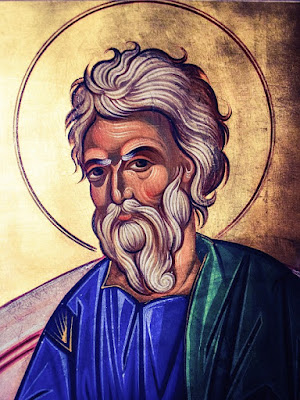St Andrew's Day 2018
How did a 1st century Jewish man from Bethsaida in Galilee, whose parents gave him a Greek name, get to be the Patron Saint of Scotland?
And why, in Scotland, is today 30 November a public holiday, supposedly in honour of St Andrew the Apostle?
There are many stories and legends that answer those questions. One good place to start to look for an answer is Michael Turnbull's article 'A History of St Andrew'.
This is probably a good day to eat fish, as Andrew was a fisherman, as was his more famous brother Simon Peter.
St Andrew is a key figure in the gospel accounts. Andrew is not presented as obviously important among Jesus' disciples - not as one of the inner 3 like Peter, James and John.
I say St Andrew is a key figure because he had a gift for bringing people together and for bringing people to Jesus.
The gospels record that Andrew
told his brother Peter about Jesus (John 1: 35 - 42)
brought a boy with a few loaves and fishes to Jesus (John 6: 1 - 15)
told Jesus about foreigners wanting to meet Jesus (John 12: 20 - 26)
The diagonal cross of the Scottish national flag is a reminder of how St Andrew is said to have been martyred.
A diagonal cross also reminds me of the multiplication symbol and the story of Jesus blessing and multiplying the gift of a young boy's 5 bread rolls and 2 small fish to feed a huge crowd of hungry people. It was Andrew who introduced that boy to Jesus, just as Andrew had previously brought his brother Simon Peter to meet Jesus and later helped some Greek people who wanted to see Jesus.
And why, in Scotland, is today 30 November a public holiday, supposedly in honour of St Andrew the Apostle?
There are many stories and legends that answer those questions. One good place to start to look for an answer is Michael Turnbull's article 'A History of St Andrew'.
This is probably a good day to eat fish, as Andrew was a fisherman, as was his more famous brother Simon Peter.
St Andrew is a key figure in the gospel accounts. Andrew is not presented as obviously important among Jesus' disciples - not as one of the inner 3 like Peter, James and John.
I say St Andrew is a key figure because he had a gift for bringing people together and for bringing people to Jesus.
The gospels record that Andrew
The diagonal cross of the Scottish national flag is a reminder of how St Andrew is said to have been martyred.
A diagonal cross also reminds me of the multiplication symbol and the story of Jesus blessing and multiplying the gift of a young boy's 5 bread rolls and 2 small fish to feed a huge crowd of hungry people. It was Andrew who introduced that boy to Jesus, just as Andrew had previously brought his brother Simon Peter to meet Jesus and later helped some Greek people who wanted to see Jesus.
Andrew the Apostle didn't do anything extraordinary. St Andrew did what all Christians are called to do. He passed on to others what he had seen, heard and experienced of Jesus. Andrew brought people to Jesus and he told Jesus about people who wanted to meet him.
St Andrew knew how to network and the importance of passing on a truthful message. Perhaps he should be the patron saint of social media?
Image Credit: dimitrisvetsikas1969 on Pixabay

Comments
Post a Comment